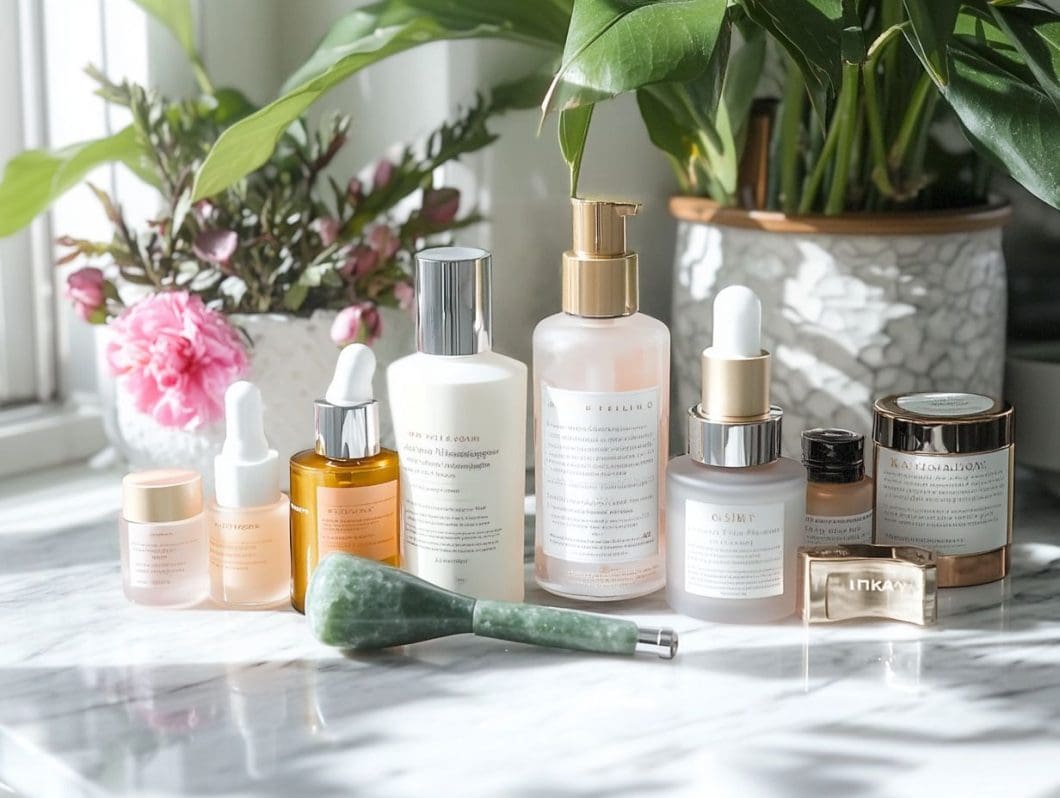Aging is a natural part of life, yet many seek ways to maintain a youthful appearance and vibrant skin through effective skincare and anti-aging strategies.
This article explores the science behind aging and the various factors that contribute to skin changes over time. From environmental influences to lifestyle choices, understanding these elements, including a balanced diet and proper hydration, can empower you to take action.
Table of Contents
We will discuss common signs of aging skin and share a complete anti-aging skincare routine, along with dietary tips, such as incorporating vitamin C and fermented foods, and lifestyle habits to help you achieve and maintain a radiant complexion.
Get ready to uncover the secrets to youthful skin, including the benefits of using sunscreen and moisturizing products!
The Science of Aging
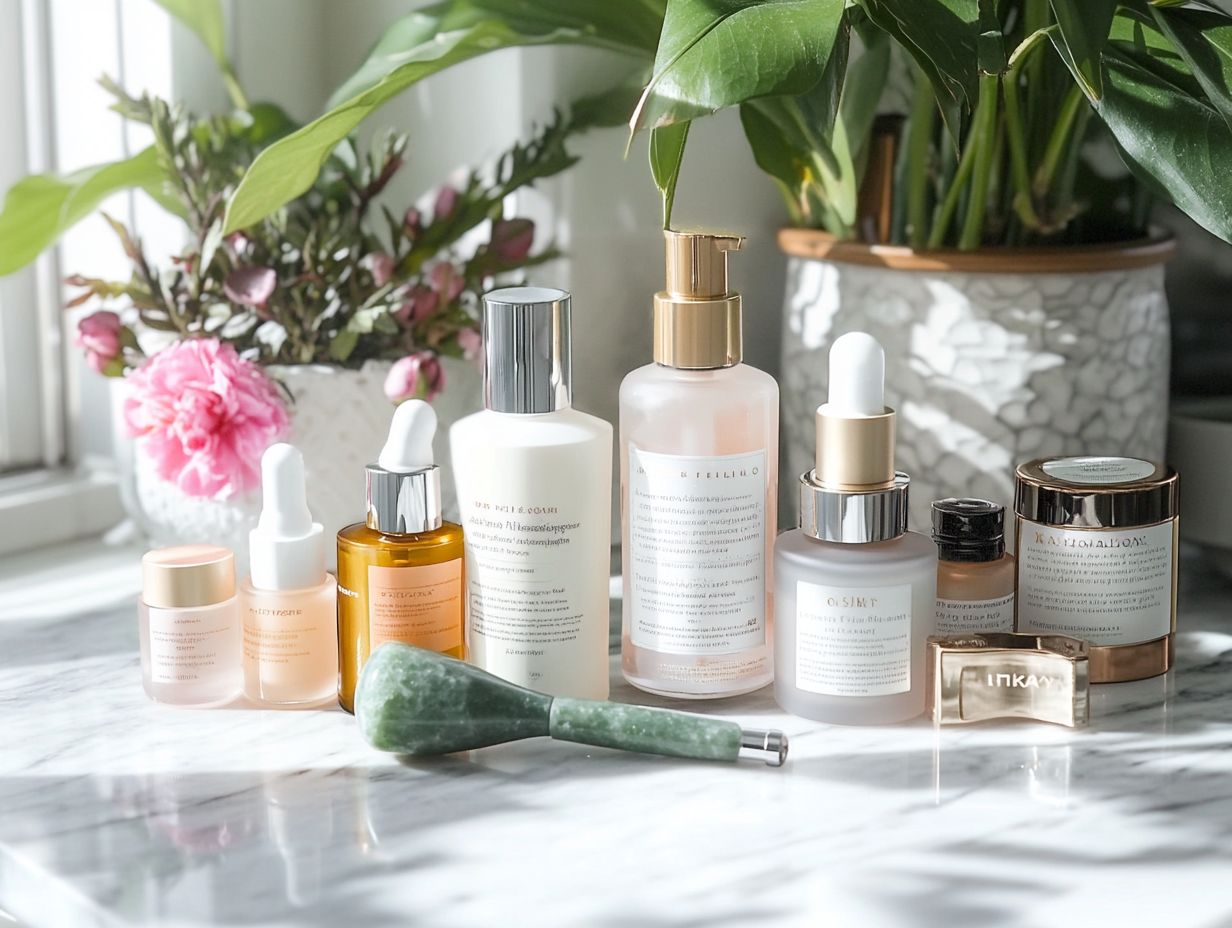
The science of aging encompasses intricate biological processes that influence the skin’s appearance and overall health over time. As individuals age, their skin experiences substantial changes, including a decline in collagen synthesis, reduced hydration, and the emergence of wrinkles and fine lines, which can be managed through tailored skincare products.
Dermatologists, such as Kathleen Felton, highlight the significance of both intrinsic factors—such as genetics—and extrinsic factors, including sun exposure and environmental stressors, in the aging process.
A comprehensive understanding of these processes is essential for formulating effective skincare strategies and enhancing overall wellness as individuals address the challenges associated with aging.
Understanding the Aging Process
Understanding the aging process is crucial for individuals seeking to maintain youthful skin and overall wellness, including heart health and stress management.
As time progresses, the skin experiences significant changes, most notably a decline in collagen production. This essential protein is responsible for maintaining the skin’s structure and firmness; however, as it diminishes, the skin loses elasticity, leading to the formation of fine lines and deeper wrinkles, which can be effectively countered with retinoids.
Plus this, the reduction of moisture and fat contributes to a more delicate appearance. Incorporating antioxidants into one’s skincare regimen can play a vital role in mitigating these effects, as they help protect skin cells from oxidative stress and environmental damage, thereby ensuring that the skin retains its vitality and resilience.
A strategic approach to skincare, enriched with these powerful compounds, can markedly enhance skin health and overall complexion.
Factors that Contribute to Aging
Numerous factors contribute to the aging process, influencing skin health and overall well-being, including environmental and lifestyle choices. Environmental elements such as sun exposure and pollution can expedite skin aging, while lifestyle decisions, including smoking, alcohol consumption, and stress levels, have a significant impact on skin texture and elasticity.
Furthermore, sleep patterns and the quality of rest are crucial in preserving youthful skin. Recognizing these factors enables individuals to implement strategies that mitigate their effects, such as using dietary supplements, and promote a healthy, vibrant appearance.
Environmental and Lifestyle Factors
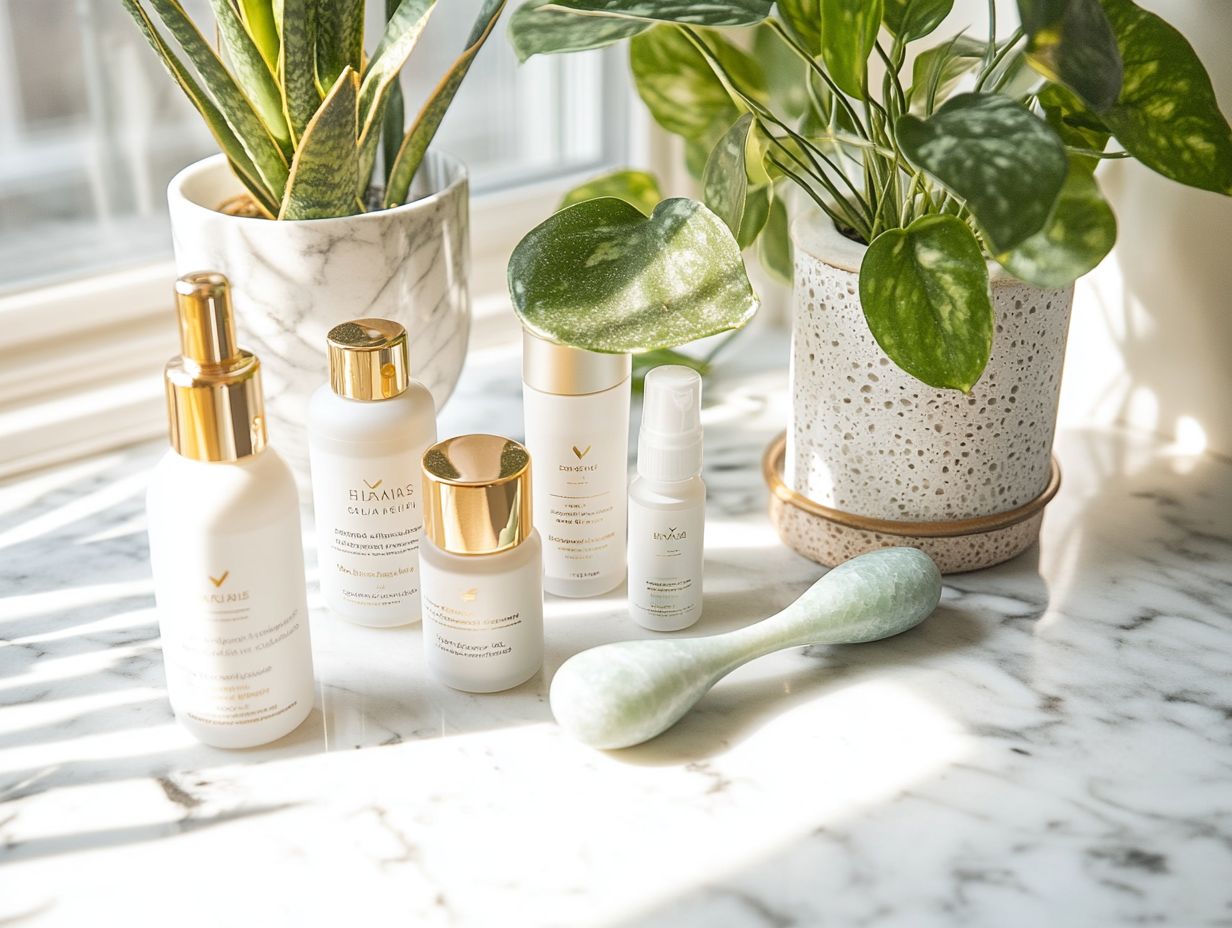
Environmental and lifestyle factors significantly influence the aging process of the skin, affecting both its health and appearance.
Exposure to ultraviolet (UV) radiation contributes to the degradation of collagen and elastin, while pollutants can induce oxidative stress, both of which may accelerate visible signs of aging. Additionally, lifestyle choices, including a diet rich in antioxidants, proper hydration, and the avoidance of smoking and excessive alcohol consumption, are essential for maintaining skin vitality.
Implementing preventive measures, such as the daily application of broad-spectrum sunscreen and the incorporation of nutrient-dense foods into one’s diet, can substantially reduce these adverse effects. These practices assist in preserving a youthful complexion and enhancing overall skin resilience.
Signs of Aging Skin
As individuals age, the signs of aging skin become increasingly evident, presenting in various forms such as wrinkles, fine lines, and alterations in skin texture. Common indicators of aging skin include a loss of elasticity, the emergence of dark spots, and a general decrease in moisture levels, which can result in dryness and an uneven complexion. Skin issues like melasma and seborrheic keratosis may also arise.
Early recognition of these signs enables individuals to pursue appropriate skincare treatments and make informed lifestyle choices that contribute to healthier, more youthful skin.
Common Changes in Skin Appearance
Common changes in skin appearance associated with aging include the development of wrinkles, dark spots, and a reduction in skin elasticity.
As time progresses, collagen production declines, leading to the formation of fine lines that can develop into deeper wrinkles, particularly around the eyes and mouth. The skin’s capacity to retain moisture also diminishes, resulting in a rougher texture and a sagging appearance.
Dark spots, often referred to as age spots, typically arise from prolonged sun exposure and hormonal changes, which can result in uneven pigmentation.
To effectively manage these concerns, it is imperative to adopt a comprehensive skincare routine that includes moisturizing agents, antioxidants, and adequate sun protection.
Moreover, lifestyle modifications such as maintaining a balanced diet, ensuring regular hydration, and minimizing sun exposure can significantly improve skin health and appearance.
Anti-Aging Skincare Routine
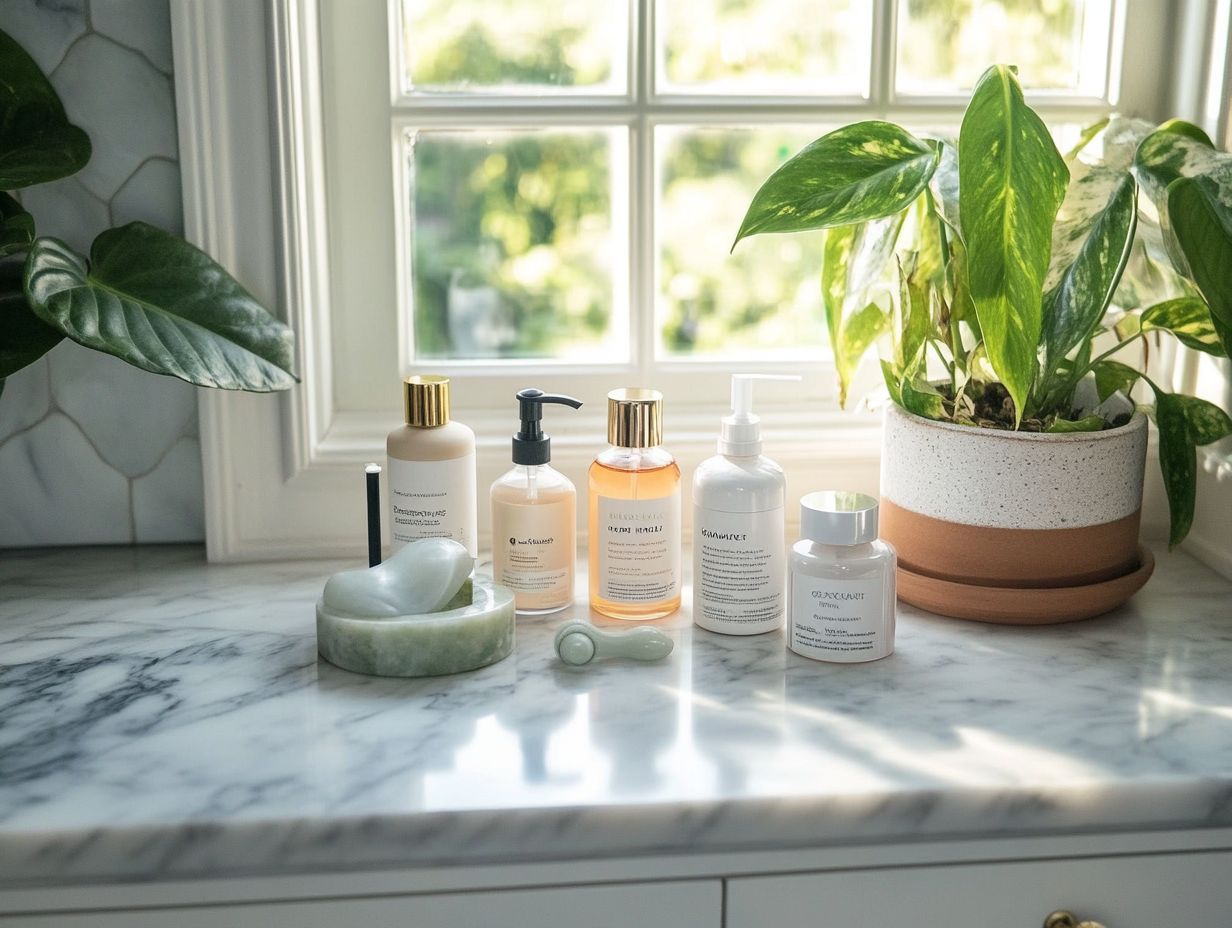
An effective anti-aging skincare routine is essential for maintaining youthful skin and addressing common signs of aging. Incorporating products that emphasize hydration, such as facial creams, along with ingredients like retinoids and vitamin C, can significantly enhance skin texture and elasticity, thereby providing significant health benefits.
Furthermore, the daily application of sunscreen is imperative to safeguard the skin from harmful UV rays that contribute to premature aging. Developing a well-structured skincare regimen tailored to individual needs can produce significant results in delaying the aging process.
Essential Steps and Products
Essential steps in an anti-aging skincare routine include moisturizing, utilizing retinoids, and incorporating vitamin C as a potent antioxidant.
These components work synergistically to promote a youthful complexion by hydrating, repairing, and protecting the skin. Moisturizing is critical, as it not only locks in hydration but also establishes a barrier against environmental stressors.
Selecting the appropriate products, particularly those containing retinoids, can significantly enhance cell turnover, thereby reducing fine lines and fostering a smoother texture. In contrast, vitamin C effectively combats free radicals, brightens the skin, and stimulates collagen production.
Daily application of a broad-spectrum sunscreen is critical within this regimen, as it protects the skin from harmful UV rays that contribute to aging while preserving the efficacy of the active ingredients.
Diet and Nutrition for Youthful Skin
Diet and nutrition significantly contribute to the promotion of youthful skin, with a balanced diet that includes an abundance of vitamins and probiotics proving particularly advantageous for both skin health and gut health.
Foods rich in vitamin C, such as citrus fruits, are known to enhance collagen synthesis and support skin elasticity. Furthermore, the inclusion of fermented foods can improve gut health, which is closely associated with skin health.
Recognizing the relationship between nutrition and skin appearance is essential for individuals aiming to maintain a vibrant and youthful complexion.
Nutrients and Foods that Promote Healthy Skin
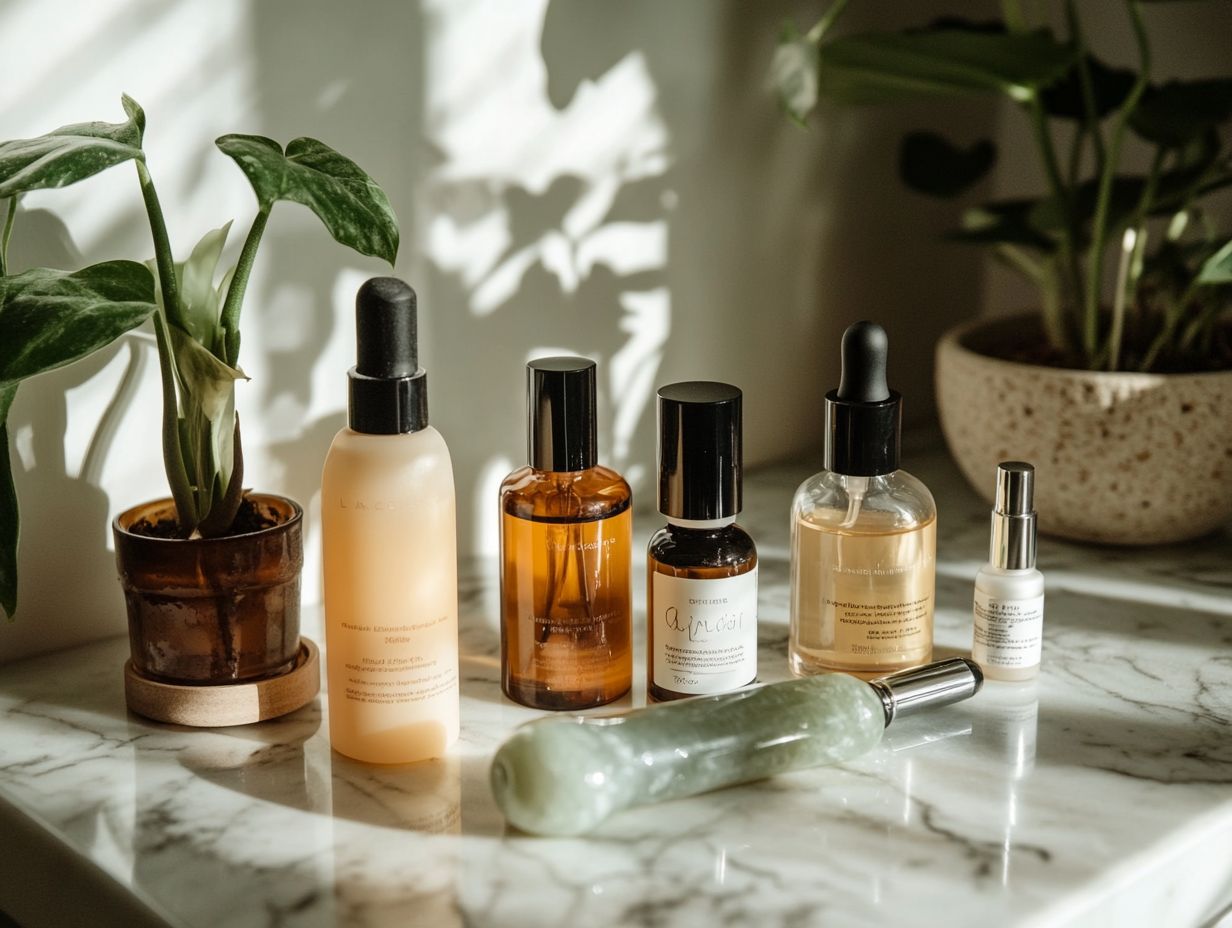
Nutrients such as vitamin C, antioxidants, and probiotics play a crucial role in promoting healthy skin and addressing the signs of aging.
These essential nutrients work synergistically to enhance skin elasticity, diminish the appearance of fine lines, and improve overall radiance. For example, vitamin C, which is abundant in citrus fruits and bell peppers, is critical for collagen production, thereby maintaining skin firmness and youthfulness. Antioxidants derived from berries, nuts, and green leafy vegetables provide protection against oxidative stress, which helps prevent premature aging.
Furthermore, probiotics, commonly found in yogurt and fermented foods, support gut health, which is intricately linked to skin clarity. By incorporating a diverse array of these foods into daily meals, individuals can achieve a balanced nutrient intake, ultimately promoting optimal skin health and a vibrant appearance.
Lifestyle Habits for Anti-Aging
Lifestyle habits play a pivotal role in the aging process, and the adoption of healthy practices, including regular exercise and self-care, can lead to enhanced skin appearance and overall well-being.
Engaging in regular exercise improves circulation and encourages collagen production, while sufficient sleep is vital for skin regeneration and repair.
Furthermore, effectively managing stress levels and avoiding smoking and excessive alcohol consumption are essential for maintaining skin elasticity and hydration.
By prioritizing these positive lifestyle changes, individuals can successfully mitigate the signs of aging and promote healthy, youthful skin using skincare strategies.
Habits to Adopt and Avoid for Youthful Skin
According to Kathleen Felton, a renowned dermatologist, implementing the right skincare routine is essential.
Adopting positive habits while avoiding detrimental ones is essential for maintaining youthful skin and overall health. Incorporating antioxidants, such as vitamin C and retinoids, can improve skin texture and delay the aging process.
To achieve glowing skin, individuals should incorporate regular exercise into their routines, as physical activity enhances circulation and facilitates the delivery of essential nutrients to the skin. Additionally, ensuring adequate sleep each night is crucial; during this period, the body engages in vital repair processes that rejuvenate and revitalize skin cells. Facial creams and skincare products rich in moisture can further enhance skin health.
Conversely, the effects of negative habits must not be underestimated. Smoking introduces toxins that accelerate skin aging, while excessive alcohol consumption can lead to dehydration and a loss of elasticity. Furthermore, poor sleep patterns can result in a dull complexion, dark circles, and accelerated aging. Sun exposure without proper sunscreen can increase the risk of skin cancer and cause dark spots and wrinkles. This underscores the importance of prioritizing holistic wellness for a radiant appearance.
Adding fermented foods and dietary supplements such as probiotics to your diet can improve gut health and support collagen synthesis, which is essential for skin elasticity.


